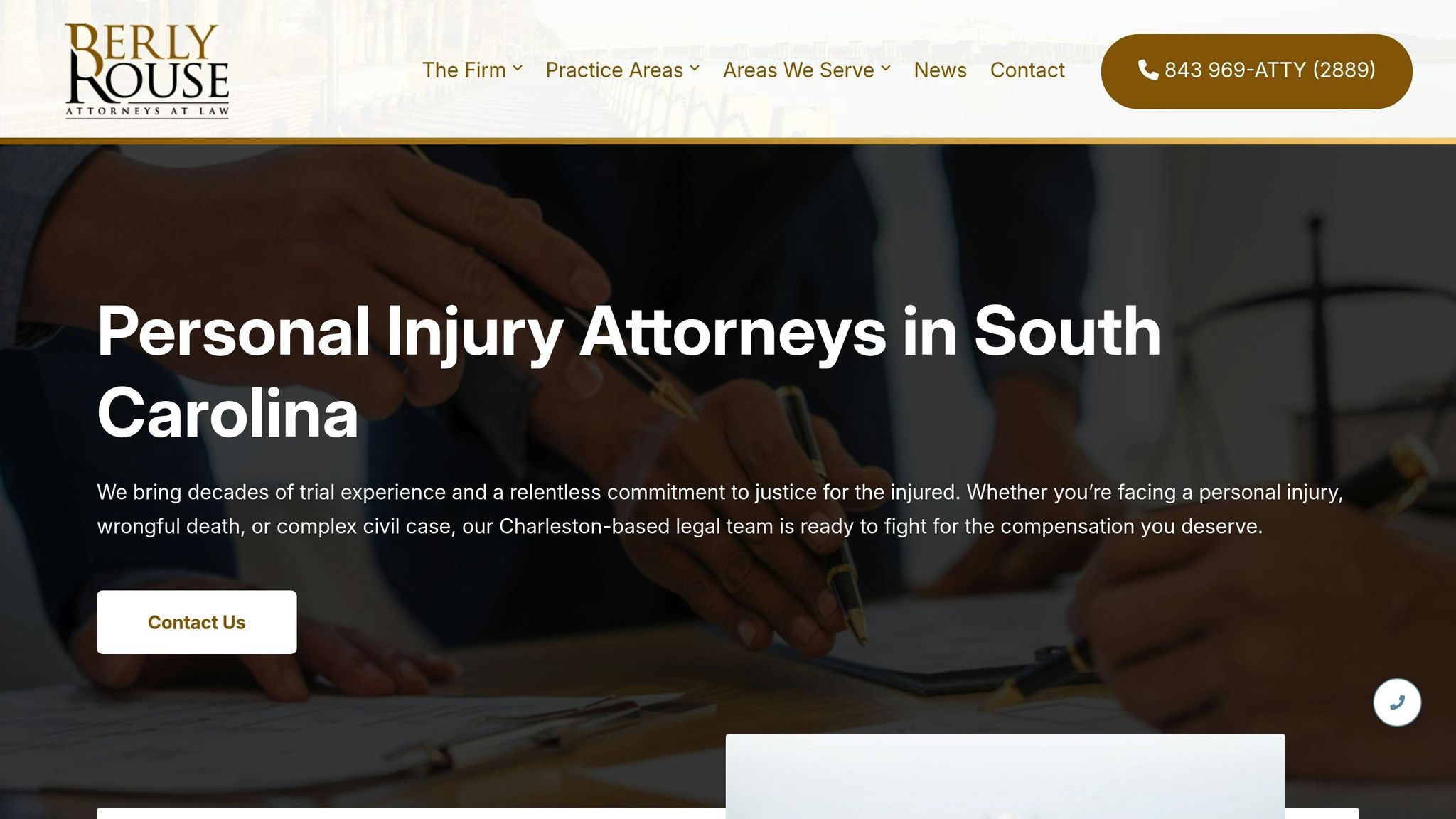what does a medical malpractice lawyer do
Story by Joel Berly
October 20, 2025

Medical malpractice lawyers help patients harmed by medical negligence seek compensation for their injuries. They handle complex legal and medical processes, including:
- Evaluating Cases: Assessing if a healthcare provider failed to meet care standards, causing harm.
- Gathering Evidence: Reviewing medical records and consulting expert witnesses to prove negligence.
- Filing Lawsuits: Meeting legal requirements like expert affidavits and submitting formal claims.
- Negotiating Settlements: Dealing with insurance companies to secure fair compensation.
- Representing in Court: Presenting evidence and expert testimony during trials.
In states like South Carolina, they must navigate specific rules, including statutes of limitations, damage caps, and mandatory mediation. Their goal is to secure compensation for medical expenses, lost income, pain, and suffering.
What Medical Malpractice Lawyers Do
Medical malpractice lawyers play a critical role in representing patients who have been harmed by inadequate medical care. Their job requires a mix of legal expertise and a deep understanding of medical practices to build compelling cases.
Evaluating the Case
The first step in handling a medical malpractice claim involves an initial consultation. During this meeting, attorneys carefully review the client’s medical history, details of the treatment, and any evidence of negligence. This helps determine whether the case meets the basic requirements for a malpractice claim and if it’s worth pursuing.
To prove malpractice, lawyers focus on four key elements:
- Duty of care: Establishing that a doctor-patient relationship existed.
- Breach of duty: Showing that the medical care fell below accepted standards.
- Causation: Linking the provider’s negligence directly to the patient’s injury.
- Damages: Demonstrating actual harm, such as medical expenses or lost wages.
Because these cases are often complex, time-consuming, and expensive, attorneys thoroughly screen potential claims to ensure they are strong enough to succeed in court. Once they confirm the case has merit, the next step is gathering the necessary evidence to support their argument.
Collecting Evidence and Expert Testimony
After determining that a case is viable, lawyers dive into the evidence-gathering process. This typically involves a detailed review of medical records, which are analyzed for any signs of substandard care. To ensure accuracy, attorneys often collaborate with medical professionals who can identify deviations from acceptable practices.
Expert testimony is a cornerstone of medical malpractice cases. Attorneys consult with qualified medical experts to confirm whether the healthcare provider failed to meet the standard of care. In some states, like New York, lawyers must also file a "Certificate of Merit" alongside the complaint. This document certifies that a medical expert has reviewed the case and agrees that malpractice occurred.
These experts play a vital role in explaining complex medical concepts to judges and juries. Their insights help clarify how a breach in care standards directly led to the patient’s harm, making their input indispensable for building a strong case.
How Medical Malpractice Lawsuits Work
Understanding how medical malpractice lawsuits unfold can help patients in South Carolina navigate the process more confidently. These cases follow a specific timeline, with clear steps and requirements at each stage.
Filing the Lawsuit
In South Carolina, patients must complete a few important steps before officially filing a medical malpractice lawsuit. The process begins with submitting a Notice of Intent to File Suit. This document serves as a formal warning to the healthcare provider about the upcoming legal action. Along with this notice, patients are required to include an affidavit from an expert witness. The affidavit outlines the standard of care that should have been provided, explains how the provider failed to meet that standard, and identifies at least one act or omission that constitutes negligence, backed by specific facts.
"In South Carolina, proving a medical malpractice claim involves two crucial steps. If we agree to take your case, we will first thoroughly assess your case to determine if the healthcare professional did not maintain the expected standard of care and skill that a reasonably competent practitioner would in similar situations. Second, we will present evidence that the injury led to significant harm, including physical pain, suffering, disability, or substantial medical costs."
- Schiller & Hamilton Law Firm
The timeline for filing is governed by the statute of limitations, ensuring cases move forward while evidence is still fresh and accessible. After the lawsuit is filed, the case transitions into the evidence-gathering phase.
Once the Notice of Intent is filed and served, the case enters the discovery phase. This is when both sides exchange information to build their cases. Attorneys can subpoena medical records, documents, and other evidence following South Carolina Rules of Civil Procedure.
During this phase, both sides gather a wide range of materials to support their arguments. These may include medical records, photos, videos, witness statements, and expert testimony. Additional documents, like bills, pay stubs, test results, and surgical notes, provide a clearer picture of the financial and medical aspects of the claim. Depositions may also be taken, with court approval, to secure sworn testimony that could be used later in court.
Many cases are resolved during discovery through mediation or settlement discussions. The thorough exchange of evidence often allows both sides to evaluate the strengths and weaknesses of their positions, leading to out-of-court agreements.
Trial and Appeals
If the parties cannot reach a settlement, the case proceeds to trial. At trial, both sides present their evidence to a judge or jury. Expert witnesses often play a key role in explaining complex medical details.
"Generally, expert testimony is indispensable in medical malpractice cases to affirm the healthcare provider’s substandard care and its direct connection to your injury. The exception is instances where the facts of the case are straightforward enough to be understood by the average person."
- Schiller & Hamilton Law Firm
The trial process includes opening statements, evidence presentation, witness testimony, cross-examinations, and closing arguments. Expert witnesses are particularly influential in helping the court understand how the healthcare provider’s actions deviated from what another provider in a similar situation would have done. This testimony often plays a decisive role in the final outcome.
If the trial verdict is unsatisfactory to one of the parties, they may file an appeal. Appeals focus on legal errors made during the trial and can extend the resolution timeline.
Throughout this entire process, having a skilled legal team is critical. Experienced attorneys help patients navigate the procedural complexities and build a compelling case to support their claims.
Types of Compensation Available
When medical malpractice results in harm, victims may be entitled to compensation for their losses. Understanding the various types of damages can help patients and their families set realistic expectations for legal claims. Medical malpractice attorneys aim to secure compensation that addresses both immediate and long-term losses, ensuring victims are covered for every aspect of their suffering and recovery.
Economic and Non-Economic Damages
Economic damages account for the measurable financial losses caused by medical negligence. These include expenses like emergency care, surgeries, medications, and physical therapy. For instance, corrective treatments often lead to additional medical costs. Economic damages may also cover lost wages if injuries prevent someone from working, as well as related expenses like transportation to medical appointments or home modifications necessary to accommodate disabilities.
Non-economic damages, on the other hand, address losses that are harder to quantify but deeply affect a victim’s quality of life. These include physical pain, emotional distress, loss of enjoyment in daily activities, and mental health struggles like anxiety or depression. Although these damages lack a specific monetary value, they are vital to a victim’s overall recovery.
In South Carolina, victims can generally seek full recovery for economic damages. However, non-economic damages may be subject to certain limitations or evaluated on a case-by-case basis, depending on state laws. In particularly severe cases of negligence, additional legal remedies may apply.
Punitive Damages
Punitive damages serve a different purpose than compensatory damages. Instead of reimbursing victims for their losses, punitive damages are designed to penalize healthcare providers for extreme misconduct and discourage similar behavior in the future. In South Carolina, punitive damages are only awarded when there is clear evidence of actions that go beyond ordinary negligence – such as willful, reckless, or wanton behavior. To ensure fairness, state laws impose limits on the amount of punitive damages that can be awarded, keeping them proportional to the misconduct. Additionally, the burden of proof for punitive damages is higher, requiring clear and convincing evidence of the provider’s actions.
How Lawyers Calculate Fair Compensation
Determining fair compensation involves a detailed analysis of several factors. Attorneys begin by documenting all economic losses, from ambulance fees to the costs of ongoing medical care. They also work with medical experts to estimate future expenses related to the victim’s injury.
When it comes to lost earning capacity, lawyers review the victim’s employment history, education, and career trajectory. Experts are often brought in to calculate how the injury might impact future earnings over the victim’s working life.
Non-economic damages, such as pain and suffering, are more complex to calculate because they lack a standard formula. Attorneys often look at similar cases to gauge potential awards in comparable situations. They may also use a multiplier method, applying a factor to the economic damages to estimate non-economic losses. Factors like the victim’s age, preexisting health conditions, and life expectancy are taken into account during this process.
In South Carolina, strict documentation and proof requirements guide the calculation of damages. Lawyers collaborate with medical, economic, and vocational experts to ensure all losses are thoroughly and accurately documented.
sbb-itb-7016c6e

When dealing with the aftermath of medical negligence, finding the right attorney can make all the difference. Medical malpractice cases are often intricate, blending legal and medical complexities, so having a lawyer who knows the local legal system inside and out is essential.
Berly Rouse Attorneys, based in Charleston, SC, brings a deep understanding of South Carolina’s legal framework to every case. The state’s medical malpractice laws include specific rules – like statutes of limitations, damage caps, and procedural requirements – that can heavily influence the outcome of a case. Founders Gregory Rouse and Joel Berly built the firm with a focus on serving local communities, ensuring they’re well-versed in regional legal nuances. This includes navigating factors such as comparative negligence, where a patient’s own actions might impact the compensation they’re entitled to.
No Upfront Costs: Free Consultations and Contingency Fees
Medical malpractice victims often face financial strain from medical bills and lost wages. To ease this burden, Berly Rouse Attorneys offers free consultations, giving you the chance to discuss your case without any financial commitment. Plus, the firm operates on a contingency-fee basis, meaning you only pay if they secure a favorable settlement or verdict for you. This approach ensures that high-quality legal help is accessible when you need it most, with no upfront costs to add to your stress.
Broad Expertise Across Legal Areas
Beyond medical malpractice, Berly Rouse Attorneys handles a wide range of cases, including personal injury, wrongful death, nursing home abuse, environmental litigation, mass torts, and class actions. This breadth of experience demonstrates their ability to tackle diverse legal challenges while maintaining a strong grasp of the intricacies each case type demands. Whether your case involves medical issues or other legal disputes, their team is equipped to provide knowledgeable and effective representation.
Conclusion
Medical malpractice lawyers play a critical role in advocating for patients who have suffered due to medical negligence. They tackle complex legal and medical challenges, from investigating claims and gathering expert testimony to negotiating with insurance companies and representing clients in court. Their expertise is especially vital in states like South Carolina, where specific legal factors – such as statutes of limitations and damage caps – can heavily influence the outcome of a case.
These attorneys do much more than just file legal documents. Their primary mission is to help victims secure fair compensation for the hardships they’ve endured. This includes covering medical bills, lost income, and damages for pain and suffering. By meticulously evaluating cases, collecting evidence, and negotiating skillfully, they ensure that negligent healthcare providers are held accountable for their actions.
For those facing the aftermath of medical negligence, having a seasoned attorney can mean the difference between receiving proper compensation or being overwhelmed by mounting bills and unresolved health issues. Proving medical malpractice is a daunting task, requiring both legal expertise and a deep understanding of the medical field. That’s why having a knowledgeable advocate is essential to achieving justice.
When medical errors occur, patients deserve allies who can navigate the intricacies of both the legal system and medical practices. These lawyers bring specialized knowledge and the ability to handle everything from insurance disputes to courtroom battles, making them indispensable in the fight for accountability and fair compensation.
FAQs
How can I tell if I have a valid medical malpractice case?
Determining whether you have a valid medical malpractice case requires examining a few critical elements. Medical malpractice happens when a healthcare provider’s negligence results in harm or injury. To establish a case, you’ll typically need to demonstrate the following:
- Duty of care: The healthcare provider had a professional responsibility to provide care for you.
- Breach of duty: The provider failed to meet the standard of care expected in their profession.
- Causation: This failure directly caused your injury or harm.
- Damages: You experienced specific losses, such as physical injuries, emotional suffering, or financial expenses.
Medical malpractice cases can be intricate and challenging. Consulting with a skilled attorney is crucial – they can review your situation, help collect the necessary evidence, and advise you on the most effective course of action.
What compensation can I receive in a medical malpractice case?
If you’ve suffered harm because of medical negligence, you could be entitled to compensation for both financial losses and non-financial hardships. Financial losses, or economic damages, might include things like medical expenses, lost income, and diminished earning potential. On the other hand, non-financial hardships, known as non-economic damages, cover less tangible impacts such as pain and suffering, emotional distress, and loss of enjoyment in life.
The amount and type of compensation you might receive depend on the specifics of your situation – factors like how severe your injuries are and how they affect your everyday life. Speaking with a medical malpractice attorney can clarify your options and guide you in pursuing the compensation you’re entitled to.
What role do expert witnesses play in medical malpractice cases, and why are they essential?
Expert witnesses play a key role in medical malpractice cases by offering their specialized expertise to determine whether a healthcare provider met the expected standard of care. These experts, typically doctors or medical specialists, help the court understand what actions a competent provider would have taken in similar situations and point out any deviations that could indicate negligence.
Their testimony is essential in showing that a provider’s actions fell short of established standards and directly led to the patient’s injury. Without their insights, it becomes much harder to establish the link between medical mistakes and the harm caused, making their contributions critical to achieving fair outcomes.
Related Blog Posts
Categories: Uncategorized




